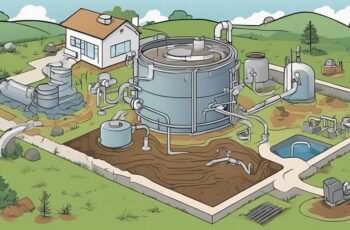Septic tank cleaners can effectively help unclog leach fields by breaking down organic matter and reducing harmful contaminants that seep into the soil and groundwater. These cleaners contain specialized bacteria and enzymes that promote decomposition, maintaining system health and preventing severe clogs. Factors like soil composition, maintenance frequency, and water table level influence their efficiency. Safety precautions, such as proper ventilation and protective gear, are essential when using these cleaners. Consider alternative solutions like introducing beneficial bacteria or seeking professional services for tailored solutions. Prioritize system functionality while being mindful of environmental and health concerns.
Key Takeaways
- Septic tank cleaners with specialized bacteria can aid in breaking down clogs in leach fields.
- Effectiveness depends on selecting the right cleaner tailored to address clogged leach fields.
- Regular maintenance using cleaners can prevent and alleviate clogs in leach fields.
- Cleaners can enhance the breakdown of organic matter, preventing further clogging issues.
- Seek professional advice for tailored solutions to effectively address clogs in leach fields.
How Septic Tank Cleaners Work
Septic tank cleaners operate by using a combination of specialized enzymes and bacteria to break down organic matter in septic systems. These cleaners contain specific strains of bacteria that are capable of breaking down various components found in waste, such as fats, oils, proteins, and other organic materials. Through a process known as bacterial breakdown, these enzymes facilitate the decomposition of organic matter, turning it into simpler compounds that can be easily absorbed by the soil.
The enzymes in septic tank cleaners play a vital role in promoting nutrient absorption within the septic system. By breaking down complex organic molecules into smaller, more manageable forms, these enzymes enable the soil to absorb essential nutrients effectively. This process not only helps maintain the health and balance of the septic system but also supports the overall ecosystem by ensuring that nutrients are recycled efficiently. Essentially, septic tank cleaners work by harnessing the power of enzymes and bacteria to facilitate the breakdown of organic matter and promote nutrient absorption within the septic system.
Potential Benefits of Using Cleaners
With the understanding of how septic tank cleaners work, it becomes evident that utilizing these products can offer several significant advantages. When used correctly, septic tank cleaners can help maintain the health of your septic system, preventing clogs and backups in the leach field. This proactive approach not only saves you the hassle of dealing with costly repairs but also contributes to the overall efficiency and longevity of your system. Additionally, incorporating a high-quality product like SEPTIFIX can enhance the breakdown of organic matter and pathogens, further improving the performance of your septic system.
In terms of environmental impact, using septic tank cleaners can aid in breaking down organic matter within the tank, reducing the likelihood of harmful contaminants leaching into the soil and groundwater. This can help protect the surrounding ecosystem and prevent pollution.
Furthermore, the long-term effects of regularly using septic tank cleaners include improved system performance and decreased maintenance needs. By promoting the breakdown of solids and preventing blockages, these products can extend the lifespan of your septic system, saving you money and hassle in the future.
Factors Affecting Cleaner Effectiveness
When evaluating the efficiency of septic tank cleaners, various factors come into play that can influence their performance. Soil composition plays a significant role in how well a cleaner can penetrate and break down clogs in leach fields. Different soil types may require specific formulations for best results. Maintenance frequency is another key aspect to keep in mind. Regularly using septic tank cleaners as part of a maintenance routine can help prevent severe clogs from forming in the leach field.
The water table level in the area where the septic system is located can also impact how effective a cleaner will be. A high water table may impede the proper flow of water through the leach field, affecting the distribution of the cleaner. Drainage issues, such as blockages or poor soil percolation, can further impede the efficiency of septic tank cleaners by limiting their ability to reach and address clogs within the leach field. Being mindful of these factors can assist you in selecting the right cleaner and maintenance schedule for your septic system.
Safety Precautions When Using Cleaners
Using septic tank cleaners demands careful attention to safety precautions in order to prevent potential hazards and ensure effective treatment of clogged leach fields. When handling these cleaners, maintain proper ventilation in the area where you are working. Poor ventilation can lead to the buildup of harmful fumes, posing health risks. It is important to open windows and doors or use fans to create a well-ventilated space.
Additionally, always wear the necessary protective gear to safeguard yourself from any contact with the cleaner. Protective gear such as gloves, goggles, and a mask should be worn to prevent skin irritation, eye damage, or inhalation of harmful chemicals. Prioritize your safety by investing in quality protective equipment and using it consistently while working with septic tank cleaners.
Alternative Solutions to Consider
To address clogged leach fields without relying solely on septic tank cleaners, exploring alternative solutions can offer effective and environmentally friendly options. Natural remedies like introducing beneficial bacteria into the septic system can help break down organic matter and restore proper drainage in the leach field. Additionally, utilizing oxygen-releasing compounds can aid in aerating the soil, promoting better absorption of wastewater. Professional services such as hydro-jetting can be effective in clearing blockages and rejuvenating clogged leach fields without the need for harsh chemicals. This method involves using high-pressure water to dislodge debris and buildup, allowing for improved water flow. Seeking advice from septic system experts can also provide tailored solutions to address specific issues with leach fields. By considering these alternative approaches, you can maintain the functionality of your septic system while being mindful of the environment and your health.


